
In a world that loves to talk, do, achieve, promote, preach, sell....what does it mean to connect, be, and listen. A podcast about #humanconnection #mentalhealth #socialhealth #empathy #belonging and #loneliness. And always thinking about justice and inclusion in all things. Join us. And share far and wide. Or start your own chapter of Sidewalk Talk in your community. www.sidewalk-talk.org
Episodes
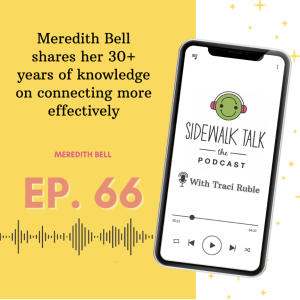
Tuesday Apr 20, 2021
Tuesday Apr 20, 2021
Meredith Bell has been helping individuals and teams communicate and connect more effectively for over 30 years. Since she began her career, a lot has changed in the ways we communicate (thanks, smartphones!), but a lot of the fundamentals—like building trust, how to encourage someone well, and practicing neutrality and curiosity—have remained the same. Even though there’s now seemingly more ways to connect than ever before, Meredith’s work is probably more vital today than it has ever been.
On this episode of The Sidewalk Talk podcast, Traci talks with Meredith, an individual she has admired from afar for a while now, on how to build genuine connection in a time when it’s all too easy to hide behind an email or text message. Throughout their conversation, Meredith talks about taking things personally, the four ways to encourage someone, and why it takes practice and accountability to re-wire our brains for connection. No matter what your work environment is like today or who you surround yourself with at work and in life, this episode on connection and communication is one you need to hear this week.
Episode Milestones
[00:07] Intro
[02:36] Meet Meredith
[07:24] What has changed, and what hasn’t, in the 30 years Meredith has been in the field
[12:59] Taking things personally
[17:26] How to build up safety and trust in the workplace
[22:39] Getting neutrality and curiosity to stick
[27:02] The practice and accountability behind re-wiring our brains for connection
[30:04] Four ways to encourage someone
[36:58] Meredith’s books
[38:27] Meredith’s word for you
[42:08] Outro
Resources Mentioned
Connect with your Team: Mastering the Top 10 Communication Skills
Strong for Performance: Create a coaching culture with learning & development programs that stick
Peer Coaching Made Simple: How to do the 6 things that matter most when helping someone improve a skill
The Prosperous Coach: Increase income and impact for you and your clients
Standout Quotes from the Episode
“One of our key goals is to help alleviate the unnecessary pain that often exists in the workplaces.”
—Meredith Bell
“Focus on serving that other person. It doesn’t matter who it is or what your past relationship has been. If you think about, how can I be present for them in a way that really serves them, it just makes a huge difference in the way that the whole interaction goes.”
—Meredith Bell
“I make a point to make note of things about a person that I genuinely appreciate in the moment.”
—Meredith Bell
“Every single person, no matter how you measure their success, we all have this need to be acknowledged and appreciated and valued.”
—Meredith Bell
Connect:
Find | Sidewalk Talk Podcast
On Instagram: @sidewalktalkorg
On Twitter: @sidewalktalkorg
Find | Traci Ruble
On Instagram: @TraciRubleMFT
On Twitter: @TraciRubleMFT
On Facebook: @TraciRubleMFT
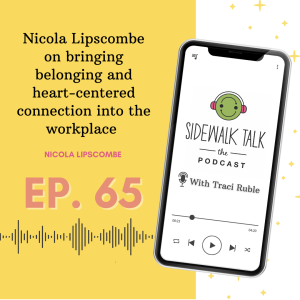
Monday Apr 12, 2021
Monday Apr 12, 2021
At some point in our lives, we’ve probably all felt like we didn’t belong. For Nicola Lipscombe, that sense of not belonging came to a head while she was working in academia and doctors discovered a cancerous tumor in her chest. Nicola knew it was time for a change, and thus began the second half of her career where belonging and heart-centeredness have taken center stage.
On this episode of The Sidewalk Talk podcast, Traci talks with Nicola on all things belonging, listening, and connection. Nicola now brings her knowledge into the workplace, hosting retreats and intensives where she helps those in the corporate world discover the power of holding space for others and themselves. Traci and Nicola discuss why they believe it’s fun to hold space for others, how to convince Type A personalities that they won’t be any less productive if they start connecting better, and how intentional listening can help us connect during a pandemic. Whether you’re already a connection guru or you could use a little more heartfelt connection in your life, you won’t want to miss this episode.
Episode Milestones
[00:07] Intro
[02:36] Meet Nicola
[09:27] How Nicola’s relationship to belonging shifted
[14:38] Heart-centered connection and belonging in the workplace
[22:47] “Embody” and “space-holding” according to Nicola
[30:16] Why it’s fun to hold space for others
[36:37] Converting Type A, driven personalities to operate out of their heart-center
[42:17] Nicola’s word for you
[44:32] Outro
Resources Mentioned
Standout Quotes from the Episode
“We crave and yearn for connection, yet we can be scared to be vulnerable enough for that to occur.”
—Nicola Lipscombe
“When you have that sense within yourself, you actually have more capacity to be with others and create that for others because you’re not so worried about yourself.”
—Nicola Lipscombe
“Embodiment is the act of settling into your body, into your skin, into the space that you inhabit. There’s an element of mindfulness, of being fully present in the moment, but it comes from being grounded within your body.”
—Nicola Lipscombe
“If we really want to fully connect with another human being, we have to embrace our own personal humanity, otherwise you’ve got a sort of half-human trying to connect with another half-human in a fully human way. It doesn’t work.”
—Nicola Lipscombe
“You grow in yourself through the act of being consciously present, openly listening to another.”
—Nicola Lipscombe
“Don’t underestimate the power of listening to be able to be a beautiful replacement for that human physical touch, because you can think of listening as a hug you can give with your ears.”
—Nicola Lipscombe
Connect:
Find | Sidewalk Talk Podcast
On Instagram: @sidewalktalkorg
On Twitter: @sidewalktalkorg
Find | Traci Ruble
On Instagram: @TraciRubleMFT
On Twitter: @TraciRubleMFT
On Facebook: @TraciRubleMFT
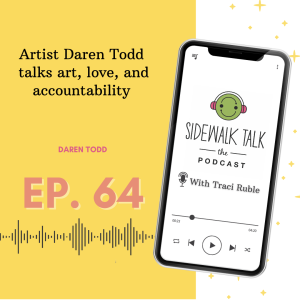
Monday Apr 05, 2021
Artist Daren Todd talks art, love, and accountability | Daren Todd
Monday Apr 05, 2021
Monday Apr 05, 2021
For many, art is a language all its own. This has never been more true for Daren Todd, a Portland-based musician turned painter who discovered painting during quarantine when he lost his bartending job. On this episode of The Sidewalk Talk podcast, Traci sits down with Daren to hear his story of gaining a following for his painting through Reddit, starting Art Larger Than Me, and his thoughts on how art can serve as both love language and accountability for the battles our country is fighting within itself.
Daren is a transgender Black man who always saw art, specifically music, as a way to express himself. But when the pandemic hit, painting became a way to express himself and connect with others in a whole new way. Together, Traci and Daren talk about how art has impacted Daren, his feelings about the Capitol Insurrection, and how art can help us create emblems of accountability that help us as a collective address our different shades of shame and racism to create a more inclusive and equal society. Daren is a dynamic advocate for the power of art and loving those around us while still holding them accountable. Don’t miss this important episode!
Episode Milestones
[00:07] Intro
[03:08] Meet Daren
[11:52] The heart behind Art Larger than Me
[14:48] How Daren hopes his art serves the marginalized communities he’s apart of
[16:40] Art as language
[19:32] Art’s impact on Daren
[22:37] Daren’s rebellious spirit as an artist
[26:03] Traci and Daren’s shared Santa Barbara history
[27:27] The impact of the Capitol Insurrection on Daren
[32:21] Emblems of accountability
[37:13] Shame in our societal consciousness
[43:41] Daren’s word for you
[45:33] Outro
Resources Mentioned
The Neighborhood Arts Collective
Standout Quotes from the Episode
“I’m almost glad I didn’t go to art school because I see so many people that have gone that are just so jaded and broken down and beaten down by that system.”
—Daren Todd
“I try to use that gift that I’ve been given to reach out to people that maybe haven’t been reached or aren’t being reached, and to speak for people who haven’t found a way to speak or have been silenced.”
—Daren Todd
“I believe that art is a language that transcends dialects and can say a lot, and it’s open to interpretation by every person because no two people see the same.”
—Daren Todd
“I believe that it’s not so much about the outcome as it is about the daily practice, and when you focus on the practice, the outcome comes secondary.”
—Daren Todd
“How much more time are we going to have to wait for a simple right to life, to freedom, to justice, to the pursuit of our happiness? And we’re not asking to be held above, we’re literally just asking to be equal.”
—Daren Todd
“You’re not going to get anywhere by avoiding things that make you uncomfortable.”
—Daren Todd
“I never want to shame someone for where they were. I just want to help them get to a better place.”
—Daren Todd
“The most grounded I feel on this earth is when I’m reaching out to help someone else. And I think if each one of us just shared a little bit of what we had, there’d be more than enough to go around.”
—Daren Todd
Connect:
Find | Sidewalk Talk Podcast
On Instagram: @sidewalktalkorg
On Twitter: @sidewalktalkorg
Find | Traci Ruble
On Instagram: @TraciRubleMFT
On Twitter: @TraciRubleMFT
On Facebook: @TraciRubleMFT
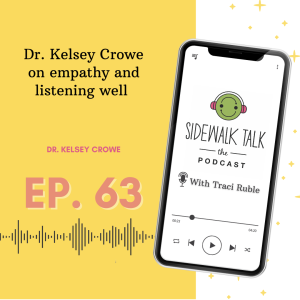
Monday Mar 29, 2021
Dr. Kelsey Crowe on empathy and listening well | Dr. Kelsey Crowe
Monday Mar 29, 2021
Monday Mar 29, 2021
Listening well isn’t an easy skill for most of us. We like to talk, and in a culture that values productivity and solutions above all else, simply listening can often feel like we’re not being useful. Dr. Kelsey Crowe, author of There is No Good Card for This, thinks differently.
An empathy coach and founder of the nonprofit, Help Each Other Out, Kelsey knows a thing or two about listening—making it her mission in life to teach us how to empathize in an increasingly self-centered world. On this episode of The Sidewalk Talk podcast, Traci and Kelsey laugh and listen together, talking about all things empathy, connection, and attention.
Throughout their conversation, Kelsey shares with us her three basic rules on empathy for idiots, how we can ask for the attention we need, and the value of gestures. Especially during a season where we’re dealing with more uncertainty than ever, empathy is so important—not just for others, but also for ourselves. If you’re looking for a practical guide to becoming a better listener, and better person and friend in the process, look no further than this dynamic and empathetic conversation between Traci and Kelsey.
Episode Milestones
[00:07] Intro
[02:24] Meet Kelsey
[06:51] What Kelsey discovered about empathy
[09:45] Kelsey’s rules on empathy for idiots everywhere
[15:09] Why it’s hard for us to not be useful
[22:23] How we ask for the attention we need
[26:23] The value of gestures
[31:25] What Kelsey’s working on next
[34:39] Sidewalk Talk in Germany and during COVID-19
[37:17] Listening during conflict
[40:26] How can we show up differently for others during COVID
[44:55] Kelsey’s wish for you
[46:40] Outro
Resources Mentioned
Standout Quotes from the Episode
“The value of hearing someone else, truly hearing, cannot be underestimated.”
—Kelsey Crowe
“If we’re thinking about how we’re going to respond, we’re not truly taking in what somebody’s feeling.”
—Kelsey Crowe
“When people are talking, they don’t only want to be validated. Sometimes it’s actually an opportunity for them to understand and build their experience in the course of telling it. And providing people the space to do that is tremendous.”
—Kelsey Crowe
“We find that listening is unproductive, that it’s not useful, when it’s so useful. So our definition of what’s useful has to expand to include presence and attention. Attention is useful.”
—Kelsey Crowe
“We need to figure out more and more ways to display emotional intelligence that’s beyond just how we talk to people.”
—Kelsey Crowe
Connect:
Find | Sidewalk Talk Podcast
On Instagram: @sidewalktalkorg
On Twitter: @sidewalktalkorg
Find | Traci Ruble
On Instagram: @TraciRubleMFT
On Twitter: @TraciRubleMFT
On Facebook: @TraciRubleMFT
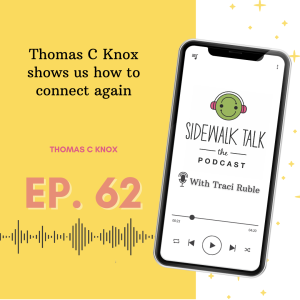
Monday Mar 22, 2021
Thomas C Knox shows us how to connect again | Thomas C Knox
Monday Mar 22, 2021
Monday Mar 22, 2021
Thomas C Knox is a connector like no other. The founder of multiple organizations all focused on fostering relationships and space for vulnerability between people, this guy is the real deal. On this episode of The Sidewalk Talk podcast, Traci sits down with Thomas, her good friend and part of the Sidewalk Talk team, to discuss how to stay connected during quarantine and relating to others even when it seems like you have nothing in common.
Thomas is the face behind Date While you Wait—a company he started in response to the stories of friends and family who told him their commute was one of the worst parts of their day. In response, Thomas stepped in with a card table and a Connect Four set, inviting commuters on the New York City subway to sit down for a chat or just a game. With a personality that made space for vulnerability and connection look easy, Date While you Wait gained national attention, and is now being turned into a TV show.
Traci and Thomas talk about how connection has changed during the COVID-19 quarantine, the willingness to step out of our comfort zones to still be there for people even if we can’t be close physically, and why finding something you can relate to with another person is the first step to realizing maybe we’re not so different after all. Don’t miss this important episode on how connecting with others matters now more than ever.
Episode Milestones
[00:07] Intro
[02:37] Meet Thomas
[11:40] Thomas’ relationship with his mom and how it shaped him
[14:21] Thomas’ Mother’s Day surprise
[19:30] How Thomas takes care of himself
[22:57] Honoring Thomas’ friend, Lloyd, who passed away
[27:27] Relating with others and being vulnerable
[33:46] Thomas’ organizations and what he’s working on right now
[36:50] How to connect during quarantine
[40:29] Sidewalk Talk phone-banking
[45:13] Mental Health Awareness month at Sidewalk Talk
[47:14] Thomas’ word for you
[50:16] Outro
Resources Mentioned
Standout Quotes from the Episode
“I just wanted to do something kind for moms. We’re lucky to have them, and we wouldn’t be here without our moms.”
—Thomas C Knox
“The best way to give back is to pay it forward—do it for somebody else. Put a smile on somebody else’s face. That’s something that really matters to me.”
—Thomas C Knox
“Everyone has something in them that someone else has, but we fight it. Once we identify what we have in common, it’s easier for us to relate.”
—Thomas C Knox
“For us to be able to find ways to adapt and still listen to our community is something that is not easy, it can be a challenge. And I’m really proud to be a part of an organization that realizes that there are people that still need our support and still need to be listened to.”
—Thomas C Knox
“Show love, because we need it now more than ever.”
—Thomas C Knox
Connect:
Find | Sidewalk Talk Podcast
On Instagram: @sidewalktalkorg
On Twitter: @sidewalktalkorg
Find | Traci Ruble
On Instagram: @TraciRubleMFT
On Twitter: @TraciRubleMFT
On Facebook: @TraciRubleMFT

Monday Mar 15, 2021
Monday Mar 15, 2021
Loneliness is something that has probably plagued all of us at different points in our lives, but it’s a feeling that has been more prevalent this past year than any before with a global pandemic that sent us all into our homes. But what if that feeling of loneliness could be combatted safely, from our homes, and through the help of strangers? Enter Open Bubble’s George de la Ville Bauge.
The Frenchman developed the connection app Open Bubble before COVID-19 became a reality last spring, but its inception has been instrumental in combatting a pandemic of loneliness in the elderly and young alike in this year of social distancing. On this episode of The Sidewalk Talk podcast, Traci talks with George all about Open Bubble, why he decided to use an app to address the loneliness he was feeling in his own life, and why connecting with strangers is such a gift. Don’t miss this timely and important conversation that can help us all step outside of our bubbles to lead less lonely lives.
Episode Milestones
[00:07] Intro
[02:44] Meet George
[08:20] Open Bubble
[11:34] The gift of connecting strangers
[17:11] Why George chose to combat loneliness through an app
[26:00] Getting in touch with our humanity again
[30:08] How meeting strangers impacts loneliness
[37:48] George’s wish for you
[41:00] Outro
Resources Mentioned
Standout Quotes from the Episode
“Loneliness is not only being isolated, you can be lonely with people around; you can be lonely because you think in different ways. What we’re trying to do is tackle the feeling of loneliness.”
—George de la Ville Bauge
“There are two hurdles we are trying to solve: whether the other person is available, and what are we going to talk about.”
—George de la Ville Bauge
“We all live in bubbles, and at some point, it’s very beneficial to open a window into one of those bubbles and let some air come in.”
—George de la Ville Bauge
“Any war in the world, between neighbors or between countries, starts because people don’t understand each other.”
—George de la Ville Bauge
“I just want to get people in touch with each other and let the magic happen.”
—George de la Ville Bauge
“Nothing really brings more joy than connection with another person. You can find real joy talking with another human who you didn’t know ten minutes before.”
—George de la Ville Bauge
Connect:
Find | Sidewalk Talk Podcast
On Instagram: @sidewalktalkorg
On Twitter: @sidewalktalkorg
Find | Traci Ruble
On Instagram: @TraciRubleMFT
On Twitter: @TraciRubleMFT
On Facebook: @TraciRubleMFT
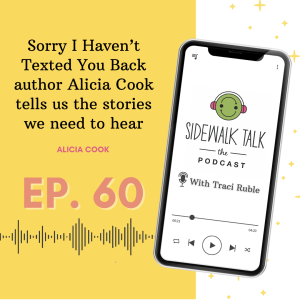
Monday Mar 08, 2021
Monday Mar 08, 2021
Drug addiction and the loneliness and mental health struggles that often precede it are highly talked about issues facing our country right now, but that wasn’t always the case. Back in 2006, when author Alicia Cook’s cousin, Jess, died of an overdose, death from drug addiction was often swept under the rug. While it’s become much more of a frontline policy talking point in the years since, people like Alicia are still determined, maybe now more than ever after the year we’ve had, to tell the stories of families plagued by the dual issues of drug addiction and mental health.
On this episode of The Sidewalk Talk podcast, Traci sits down with Alicia, author of the wildly beloved book of poems, Sorry I Haven’t Texted You Back, to discuss the biggest lessons Alicia’s learned about drug addiction and loss throughout her journey, the intention behind her book, and the policy changes around drug addiction and mental health both women hope to see happen in the near future.
Alicia’s journey of becoming a voice to this voiceless population of people affected by drug addiction really started when her cousin Jess overdosed at the age of 19. Alicia takes a few minutes to honor Jess during this conversation, sharing the other stories that have touched her the most in the process. Traci and Alicia’s conversation concludes with Alicia’s mission to give voice to the loneliness of our generation, and her word for you: everything is temporary, sometimes we just have to wait for the sun to come up on a new day. This is a vitally important conversation, don’t miss it.
Episode Milestones
[00:07] Intro
[03:02] Meet Alicia
[06:50] Honoring Alicia’s cousin, Jess Cook
[11:33] The biggest lessons Alicia has learned on her journey
[14:56] The stories that have touched Alicia the most
[20:04] Alicia’s intention for Sorry I Haven’t Texted You Back
[26:55] How Alicia has fun amidst writing about a lot of heavy stuff
[29:46] Giving voice to loneliness
[34:35] Policy changes around drug addiction and mental health
[41:09] Alicia’s self-care routine
[45:26] Alicia’s word and poem for you
[48:12] Outro
Resources Mentioned
Sorry I Haven’t Texted You Back
Stuff I’ve Been Feeling Lately
Standout Quotes from the Episode
“There wasn’t a voice for these families, and I inevitably became that voice.”
—Alicia Cook
“It’s always so scary to put something so vulnerable and personal out there into the world. But what I’ve learned is, it’s necessary.”
—Alicia Cook
“Dismantling the stigma—the number one weapon we have to do this is our storytelling.”
—Alicia Cook
“Advocates are born the minute someone they love dies.”
—Alicia Cook
“Our mental health, whether we’re in a good state or a bad state, touches so many parts of our lives, and it’s impossible to compartmentalize, even though the world tells us we need to compartmentalize.”
—Alicia Cook
“When someone wants to recover, and wants to begin that journey, there needs to be a bed for them. They need help immediately—they can’t wait another day.”
—Alicia Cook
“Even if you feel like things can’t get any worse, that things won’t get better in your life, you need to just hold on, because everything is temporary. Sometimes you just have to wait for the sun to rise and a better day to begin.”
—Alicia Cook
Connect:
Find | Sidewalk Talk Podcast
On Instagram: @sidewalktalkorg
On Twitter: @sidewalktalkorg
Find | Traci Ruble
On Instagram: @TraciRubleMFT
On Twitter: @TraciRubleMFT
On Facebook: @TraciRubleMFT

Monday Mar 01, 2021
Frank Carbajal on building the Latino future | Frank Carbajal
Monday Mar 01, 2021
Monday Mar 01, 2021
The Latino community is one that has felt the devastating effects of COVID-19 firsthand. As essential workers and part of a people group that values family and work ethic above all else, the pandemic has wracked this already marginalized minority. But author and founder of EsTiempo: “It’s Time,” Frank Carbajal, is here to tell us that the Latino future is still bright for these resilient individuals.
On this episode of The Sidewalk Talk podcast, Traci talks with Frank about how his story of resiliency and perseverance is just one of many in the Latino community. The goal of Frank’s work is to uplift as many Latino individuals as possible, and together he and Traci covered all sorts of topics in that vein, from how to combat the negative rhetoric often thrown at the Latino community to why loneliness affects Latinos in a particularly potent way.
The episode concludes with Frank’s heartfelt story of discovering the humanity of a man who had lost it all, and why he wants to encourage you, the Sidewalk Talk volunteer, to always remember that we all have a story to tell. Frank has some beautiful truths to share, don’t miss this episode!
Episode Milestones
[00:07] Intro
[00:58] Meet Frank
[08:00] Frank’s story of resiliency
[17:21] Building the Latino Future’s impact
[22:04] Combatting negative rhetoric against the Latino community
[26:02] Community and loneliness in the Latino population
[35:34] Frank’s word for you
[41:58] Outro
Resources Mentioned
Building the Latino Future: Success Stories for the Next Generation
Standout Quotes from the Episode
“You can’t fail when you’re passionate. There’s no failure in passion.”
—Frank Carbajal
“I think of my parents when I see the migrant, farm-working community. That’s how my parents made their success. Words and framing matters.”
—Frank Carbajal
“With support, loneliness means that you’re not alone. You’ll be helped and you’ll be listened to.”
—Frank Carbajal
“We all have a story to share and we all should be respectful of every human life.”
—Frank Carbajal
Connect:
Find | Sidewalk Talk Podcast
On Instagram: @sidewalktalkorg
On Twitter: @sidewalktalkorg
Find | Traci Ruble
On Instagram: @TraciRubleMFT
On Twitter: @TraciRubleMFT
On Facebook: @TraciRubleMFT
Read the rest of this entry »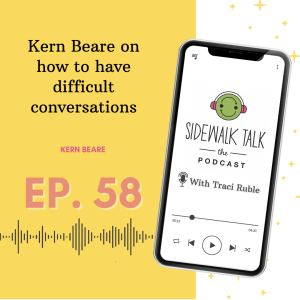
Monday Feb 22, 2021
Kern Beare on how to have difficult conversations | Kern Beare
Monday Feb 22, 2021
Monday Feb 22, 2021
Difficult conversations are something that we’ve had to have a lot of over the past four years. But just when it feels like you can’t even listen to someone who believes differently than you anymore, in walks someone like Kern Beare to help you realize maybe we aren’t so divided after all.
On this episode of The Sidewalk Talk podcast, Traci talks with Kern, author and creator of the Difficult Conversations Project, all about how to have those difficult conversations in light of everything we’ve been through in the past four years, and really, the past few months as well. Difficult Conversations Project was birthed out of the aftermath of the 2016 presidential election when Kern, along with one of his sons, decided to travel the country on a “listening tour,” setting up conversations with a variety of people with a diverse set of belief systems to try to understand how our country could have come to this place of division and hatred.
In this conversation, Traci and Kern discuss what he learned on that first tour that sparked the creation of Difficult Conversations, how to listen without the need to be right, the push and pull between love of neighbor and the fight for justice, and how we reconcile our capitalist system with a belief that people should always be put first. Whether you’ve had a difficult conversation lately or you’re looking to have these types of conversations better in the future, this podcast episode is for you!
Episode Milestones
[00:07] Intro
[00:58] Meet Kern
[07:41] How the 2016 presidential election birthed the Difficult Conversations Project
[15:02] Listening without needing to be right
[20:39] The dichotomy between love and justice
[27:54] Kern’s thoughts on the 2020 presidential election
[31:48] Capitalism versus a people-first approach
[36:52] Kern’s word for you
[39:29] Outro
Resources Mentioned
Difficult Conversations Project
Difficult Conversations: The art and science of working together
Standout Quotes from the Episode
“The intention of life is to be loving, totally loving. And to be totally loving we have to deal with the parts of ourselves that get in the way of being totally loving.”
—Kern Beare
“The fundamental problem is a lack of relationship and a lack of connection. I saw the ability to engage in difficult conversations as a process for healing that disconnection.”
—Kern Beare
“Difficult conversations trigger our flight, flee, freeze survival drive.”
—Kern Beare
“A window’s been opened up, that if we don’t take advantage of, we’re going to really regret it. And we need to do more to reach out to one another, to connect with each other. We can’t think that, oh now we can relax.”
—Kern Beare
“We are fully capable of meeting the moment. And I think we need to have faith in ourselves to meet this moment.”
—Kern Bearne
Connect:
Find | Sidewalk Talk Podcast
On Instagram: @sidewalktalkorg
On Twitter: @sidewalktalkorg
Find | Traci Ruble
On Instagram: @TraciRubleMFT
On Twitter: @TraciRubleMFT
On Facebook: @TraciRubleMFT
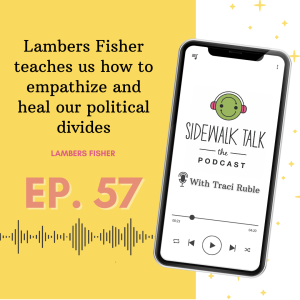
Monday Feb 15, 2021
Monday Feb 15, 2021
Our world is more diverse than ever before, which is a good thing, but we’re also growing increasingly more divided within that diversity of thought, background, belief, and life experience. How do we become bridge-builders in a world that touts our differences as reasons to hate the other? Therapist and speaker, Lambers Fisher, has a few ideas.
On this episode of The Sidewalk Talk podcast, Traci sits down with Lambers to talk about empathy and how we bridge the gaps that seek to divide us. Throughout their conversation, Lambers and Traci hit on some hot-button topics, including how to own our own feelings and stances on an issue while still making space for someone to disagree with us, knowing our capacity for being a bridge-builder, and their thoughts on how to get past the divides caused and amplified by the most recent presidential election.
Through it all, Lambers emphasized the expansion of empathy as his “why,” and the answer to so many of the connection problems plaguing our country and society. Looking for a prominent voice seeking to build up relationships, even when we disagree, rather than tear them down? Don’t miss this episode of The Sidewalk Talk podcast.
Episode Milestones
[00:07] Intro
[00:59] Meet Lambers
[06:04] Expressing our feelings of difference
[11:15] Owning our feelings and maintaining our stance while empathizing with the other
[18:02] Lambers’ why: expanding empathy
[19:11] Getting past our divides from the presidential election
[31:57] Listening to understand the other side and share vulnerability
[35:57] Knowing when and how to be a bridge-builder
[42:39] Lambers’ word for you
[45:13] Outro
Resources Mentioned
Standout Quotes from the Episode
“Our differences don’t have to be divides. We can say, ‘yes, we’re different, but we also have similarities.’”
—Lambers Fisher
“We won’t know everything all the time, but if we’re open to learning along the way then other people will see that receptivity and say, ‘okay, maybe there’s something to that.’”
—Lambers Fisher
“My big ‘why’ is to hopefully create relationship standards that are a lot harder to break. I want there to be so much empathy, that it’s contagious.”
—Lambers Fisher
“You can’t discount the legitimacy of someone’s feelings just because they expressed it in a way you don’t prefer. We have to give safe place for that.”
—Lambers Fisher
“I believe that we all have the capacity to empathize in some way. Is it as much as you want or need in the moment? I don’t know. But you won’t know until you try.”
—Lambers Fisher
“Relationship-building matters. It plants seeds that impact every relationship they’ll have.”
—Lambers Fisher
Connect:
Find | Sidewalk Talk Podcast
On Instagram: @sidewalktalkorg
On Twitter: @sidewalktalkorg
Find | Traci Ruble
On Instagram: @TraciRubleMFT
On Twitter: @TraciRubleMFT
On Facebook: @TraciRubleMFT
